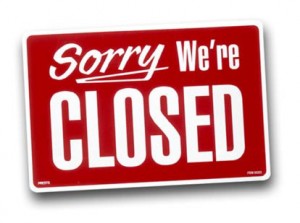Over the years I’ve been lucky and unlucky to work at, own, develop and acquire many restaurant concepts. Some have succeeded, some have failed miserably. I’ve both been a part of a “very lean” startup and have worked at large company with deep pockets. And as I get older, I’m able to understand why certain concepts have made it through the turbulent times and why some have faltered. Over the years, I’ve also met people at every level-in this industry-from executives at billion dollar global companies to owners of neighborhood corner bistros – which has given me insight into the most common pitfalls for new businesses. So, I’ve decided to share some of my lessons learned, which are equally applicable to restaurants and startups.
These are the most common mistakes early businesses make:
- Not understanding the competitive landscape
- Poor inventory management
- Customer service
- Lack of experience
- Location
All of these are valuable lessons and points of execution that make a difference. But I want to dive into more spectral approaches that are vital to launching a business. The flowing are my top five reasons for why most restaurants fail:
1. Undercapitalization
One thing is certain. Opening a restaurant is an expensive endeavour. Depending on the type of restaurant you plan to open, you may need anywhere between $50,000 to $500,000 or more. Even recently, I’ve spoke to many restaurant owners who have fallen into this trap. They’ve had to push up an opening date because of diminishing funds or mounting debt that they have to start paying down. When I opened my first restaurant, I took out an SBA loan and drained my savings account. I remember burning through my loan prior to opening day. Bad mistake. The loan should be something that is built into your business plan to get you through the first year of business.
A few tips: Don’t go crazy buying new equipment and furniture, instead consider the benefits of used equipment. Be frugal with your opening loan–don’t treat it like you just won the lottery. Use it like a savings account, it should only be used for the absolute necessities. Unfortunately what happens at this state is that the restaurants vision is lost because of the inability to finance the venture.
A restaurant that runs out of working capital before it can start running at optimal efficiency and turn a profit is doomed. Once that happens, there is rarely a way to recoup the concept.
I cannot stress this enough, you need enough cash reserve for the first 12-16 months to make sure you have enough buoyancy for all of the uncertainty you will face operating a restaurant. It is a cash-in-cash-out model, and for the first year or so, you cannot predict accurately enough to understand your potential cash flow.
2. Not Being Nice
The first thing anybody opening a restaurant should know, is that it’s a hospitality business. For me, this is the one thing many restaurateurs underestimate. Food is easy; Being courteous, kind and well mannered to everyone of your guests, every time, is not. Great concepts understand this and build hospitality into their core. It’s something every concept must execute for every guest.
I will always remember something a guest of mine said to me after an incident in one of my restaurants: “every guest that comes through your door, is the most important guest you’ll ever have.” He was right.
People eat out for enjoyment and leisure. They leave their stressful lives outside the doors. Ironically, owning and operating a restaurant can be one of the most stressful experiences you’ll ever face. You have to play the role of the guest and approach your business from their lens. I always used to say to my employees when I owned my restaurant, “We’re only serving sandwiches, soups and salads. That’s it.” Keep it simple, smile and create an enjoyable and engaging environment for your employees and guests.
3. Truth in Concept
Lack of Concept equals restaurant disaster. I’ve often told people that the world doesn’t need another restaurant. I see restaurants opening in my little town of Saratoga Springs, NY every few months, and many of them don’t seem to have a purpose.
A successful restaurant needs a clear concept that doesn’t deviate because of turbulent waters. Owners that can’t describe their concept in a quick elevator pitch will generally fail within the first year. Many restaurant owners try to appeal to the greatest audience, but in doing so, the concepts become too general and possess no unique competitive edge. The restaurant gets lost in a sea of sameness. Whatever you scribbled down on a notepad as your original idea has to resonate with customers years after.
One of the most untapped resources for innovative ideas is your employees. Don’t be afraid to offer them incentive for ideas and new perspectives on the business since they are the driving force behind your brand.
4. Details, Details, Details.
I’ve learned a lot about the importance of the customer journey with my current employer, Panera. Individual and small details of the concept and operations may appear insignificant on the surface, but collectively, these details can have a major impact on your brand and ultimately the success of your restaurant. Considered individually, clean floors, bathrooms, napkins, employee attire, cutlery and lighting may not seem as a main driver for your business, but all are part of what shape your guests perception of your restaurant. Details matter at every point of contact. I’m dumbfounded by how many concepts don’t pay attention to the details of their business.
In a restaurant setting, nothing should be left to chance. Everything should be organized and planned to make sure the experience for your guests is fashioned at your highest level.
5. Lack of homage and time commitment
The only way to maintain familiarity with your restaurant is to spend a significant amount of time there, both physically and mentally. It’s a gritty business in terms of mental currency and you have to be ready to spend some of that frequently and often. However, don’t confuse physical presence with micro-management. Use your time wisely and strategically since the time spent will be adequate and often tireless, especially during opening.
Cherish and make strategic decisions while you’re in your restaurant. Every time you’re in your environment, you can make key decisions that will benefit your business. I’ve always looked to other industries for modeling efficiencies in your execution. Restaurants sometimes tend to be a little clunky. Look for ways to make sure your time is well spent and impactful.
Let’s face it, when you’re running a restaurant – you’re generally working when other people are playing. It’s a leisure time for most folks while you’re trying to make a dollar and pay the rent. Owning a restaurant can never be about the money. If you open because you think you’re going to be the next Ray Kroc – good luck.







